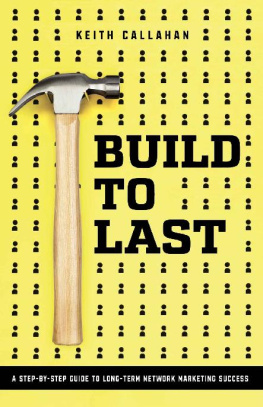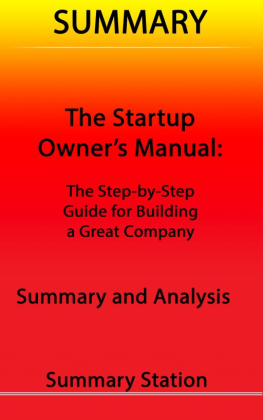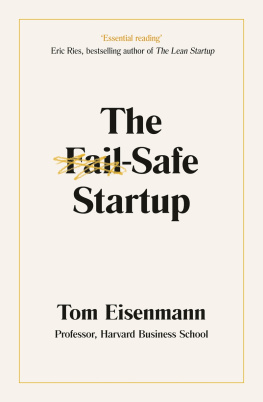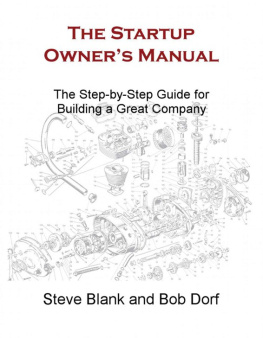Callahan - Startup Field Guide: Mistakes To Avoid, Tips To Get Ahead
Here you can read online Callahan - Startup Field Guide: Mistakes To Avoid, Tips To Get Ahead full text of the book (entire story) in english for free. Download pdf and epub, get meaning, cover and reviews about this ebook. year: 2015, genre: Business. Description of the work, (preface) as well as reviews are available. Best literature library LitArk.com created for fans of good reading and offers a wide selection of genres:
Romance novel
Science fiction
Adventure
Detective
Science
History
Home and family
Prose
Art
Politics
Computer
Non-fiction
Religion
Business
Children
Humor
Choose a favorite category and find really read worthwhile books. Enjoy immersion in the world of imagination, feel the emotions of the characters or learn something new for yourself, make an fascinating discovery.

Startup Field Guide: Mistakes To Avoid, Tips To Get Ahead: summary, description and annotation
We offer to read an annotation, description, summary or preface (depends on what the author of the book "Startup Field Guide: Mistakes To Avoid, Tips To Get Ahead" wrote himself). If you haven't found the necessary information about the book — write in the comments, we will try to find it.
Callahan: author's other books
Who wrote Startup Field Guide: Mistakes To Avoid, Tips To Get Ahead? Find out the surname, the name of the author of the book and a list of all author's works by series.
Startup Field Guide: Mistakes To Avoid, Tips To Get Ahead — read online for free the complete book (whole text) full work
Below is the text of the book, divided by pages. System saving the place of the last page read, allows you to conveniently read the book "Startup Field Guide: Mistakes To Avoid, Tips To Get Ahead" online for free, without having to search again every time where you left off. Put a bookmark, and you can go to the page where you finished reading at any time.
Font size:
Interval:
Bookmark:
Startup Field Guide
Mistakes To Avoid, Tips To Get Ahead
By Sean Callahan
Many thanks to everyone who has helped me make it this far along the journey.
To the people who cheered from the beginning, and to the people who said it would never work. Without you, this guide would have never been possible.
Thank you all for the inspiration to carry on learning.
A special thanks to my family and friends for always being there for me.
Introduction
The beginning
Before I became an entrepreneur, I didnt know what the top of the mountain looked like or how difficult it would be to climb. All I knew was that I had a good idea and the determination to start my first company. I was naive and a bit foolish, which allowed me to take risks and do things I would have never done otherwise. However, had I known the challenges I would face around the corner, I would have approached building the business quite differently. Like anyone with perfect hindsight, I feel like I should have been better prepared to climb through the valleys and canyons toward the top of mountain.
Always looking to learn
Fifteen years later, having started a handful of companies, Ive made my share of mistakes. Each business had its own set of challenges and setbacks that have led to valuable learning about building and growing a company. I am committed to continuous learning through reading books, obtaining hands on experience, and gleaning wisdom from those around me. Applying what I have learned from my past, each new company becomes a bit easier to build and grows larger than the last.
What lies ahead
The guide that you are about to read is filled with potential obstacles and pitfalls that I have encountered. If you are aware of them ahead of time, you will be more likely to succeed. This guide will teach you tactics to avoid the mistakes I made while building my company, and then eventually negotiating the sale of it. You will learn tips on how to better prepare yourself in the areas of legal, finance, sales, business development, and marketing before you start your own company and travel up the proverbial mountain.
Along the way, I will provide you with useful exercises and next steps that I recommend to those who come to me for business advice. I hope this startup guide helps you, and puts you on a formidable path towards success.
Table of Contents
Chapter One: Foundation
Chapter Two: Product Development
Chapter Three: Legal
Chapter Four: Finance
Chapter Five: Sales
Chapter Six: Business Development
Chapter Seven: Marketing
Chapter Eight: Team
Chapter Nine: Leadership
Chapter Ten: The Future
Chapter One: Foundation
Make sure your business is solving a problem
The worst thing you can do is to start a business just to start a business. One of the biggest problems entrepreneurs make is going into business and not solving a real problem. Your business is destined to fail if this is the approach you are taking. There are lots of problems out there to be solved. The best businesses usually come naturally. They are organic and born through solving a problem you or someone close to you has encountered.
Start by identifying problems you or those around you are experiencing in every day life. If you or people you know have the problem, there is likely someone else who has that same problem as well. Go into business to solve a problem, preferably a problem you have experienced yourself. Once you have determined the problem exists (and is real), you need to come up with a solution. Then, you must ask yourself if this is something you need to be solving, or if it would be better to let someone else solve it. In fact, there may already be someone who is solving the problem. If that is the case, see how your solution stacks up. Will you be able to do it better, cheaper, faster, etc. than them? Be honest with yourself because building a business is hard work.
Know how big of a business you are building
Once you have identified a problem and come up with a solution, it is time for you to figure out how big of a business you are building. Typically, in a successful business, the solution addresses a specific pain point for a group of customers. The number of people who want your solution to their pain point will dictate the size your business can grow. You either have a small market where you can build a lifestyle business, a venture backed business that can scale to reach millions of customers, or somewhere in between. The size of the business you are looking to build will determine specific ways you structure it from the beginning (we will get into this later on in the guide).
Identify your business model early on
The sooner you can identify your business model, the quicker you can attempt to validate it. You wont figure it out right away, but making a list of potential models of making profit (not just revenue) is a good place to begin. Once you have a list of models, talk with customers to figure out ways to test those models. For example, do people pay the price you are setting for your product? If so, is it scalable to reach the masses? The best business models are the ones where you invest a dollar and get $10 back, and can repeat that over and over again.
Build a company you will want to run five years from now
You dont start a company just to sell it. Some do, but it is much easier said than done. Not everyone is lucky enough to be able to start a company and sell it for millions of dollars within 18 months of its inception. You need to have passion for whatever business you are going to build because it is not likely youll be able to sell it quickly. In most cases, you will be working at the company you build for a long time. When you start a company, expect to be in it for the long haul or you might be disappointed.
Find a partner
Building a business alone is tough and lonely. Find a person that you know, like, and trust who complements your skill set. You will quickly discover how motivated and productive you are when you have a partner by your side.
Explore: CoFoundersLab, FounderDating, and YouNoodle to meet other entrepreneurs to join you.
Create a business plan, even though you probably wont follow it
It is highly recommended in the traditional business world to write a business plan. It is extremely important for you to put your thoughts to paper, but a business plan isnt necessarily required. The best thing you can do is put together a presentation with no more than 10 slides, including a clearly defined problem, solution, business model, strategy for execution, competitive landscape, and so forth. The reason you dont need to do a full-blown business plan is you probably wont even follow it. When you put together a 10-slide presentation, it is much less time consuming and will remain an iterative process that you are tweaking and adjusting. You will learn that building a business works exactly the same way.
Read: The 10/20/30 Rule of PowerPoint by Guy Kawasaki to learn how to make a great presentation.
Outsource non-core competencies
You can outsource a lot of your non-core competencies until you grow big enough to bring them in-house. It may not make sense for you to do your own accounting, payroll, or human resources right from the start. These types of activities are not even full-time jobs for startups. Therefore, you dont need to hire someone to do them. Find a reputable company and hire them on a contract basis to take these activities off your plate. Manage the company and make sure they do what they are suppose to do, but get back to focusing on the strategy of your business.
Explore: Insperity to outsource your HR and business solutions.
Next pageFont size:
Interval:
Bookmark:
Similar books «Startup Field Guide: Mistakes To Avoid, Tips To Get Ahead»
Look at similar books to Startup Field Guide: Mistakes To Avoid, Tips To Get Ahead. We have selected literature similar in name and meaning in the hope of providing readers with more options to find new, interesting, not yet read works.
Discussion, reviews of the book Startup Field Guide: Mistakes To Avoid, Tips To Get Ahead and just readers' own opinions. Leave your comments, write what you think about the work, its meaning or the main characters. Specify what exactly you liked and what you didn't like, and why you think so.











